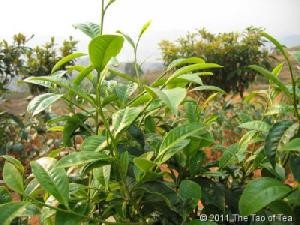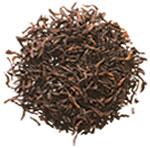Leaf Type: Black
Where to Buy: The Tao of Tea
Product Description:
The Golden Tips Assam is made from a distinct Camellia Assamica plant varietal growing only at a handful of estates. The leaves are withered, bruised with a rolling machine, oxidized and then oven roasted. In making the Golden Tips, the oxidization is slightly longer than in the case of making darker Assams. The Golden Tips are precious for the tea gardens as they fetch a higher premium in the market.
The high volume of essential oils in the Golden Tips Assam is evident immediately after the tea is served, as a thin layer of oil quickly coats the surface of the tea giving it a self-creaming appearance. These are beneficial oils that protect the body from carcinogens and give tea its anti-aging properties.
Taster’s Review:
This is quite honestly one of the best – if not THE best – Assam teas that I’ve ever tasted.
The leaves look a lot like a tippy Yunnan, lots of golden tips amongst beautiful, deep mahogany colored, twisted leaves. It brews to a typical Assam color: reddish brown liquor that has a light fragrance that is somewhat fruit-like with notes of spice.
This tea is so smooth – remarkably smooth! – with a sweetness that falls somewhere between honey-like and caramel-like. It has a creaminess to it that I have never experienced from an Assam before. This doesn’t need the addition of milk or cream … the creaminess is built right in! Of course, if you wish to add it, I see nothing wrong with that.
This has many of the attributes one would expect from an Assam: a deep, rich flavor with a malty quality, and a nice bake-y background to it. It also has that delicious chewy characteristic that I’ve grown so fond of in an Assam. But where other Assam teas end this one seems to just begin. 
The creamy flavor that I previously mentioned seems to enhance the malty tones of the tea so nicely. There are notes of fruit in the background. And even the astringency is different here. With a typical Assam tea, I expect a certain amount of astringency to hit the back of the palate at the finish. But, this one doesn’t have that. There is some astringency, but it is light – much lighter than most Assam teas – and it seems to hit the palate at the start of the sip, just before the flavors begin to arrive onto the palate. The dryness from the astringency seems to get swept away by the amazing flavors of the tea.
This is truly a remarkable Assam. If you enjoy Assam tea, this is one that you really must try. But don’t be surprised if you will find yourself making a permanent space for it on your tea shelf. This Assam makes me re-think what an Assam should be!

